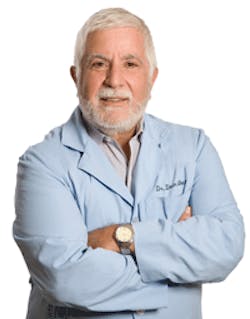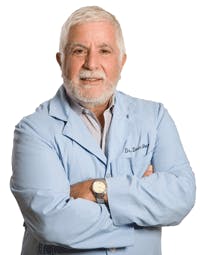Interview with Dr. Dan Fischer
by Jeffrey B. Dalin, DDS, FACD, FAGD, FICD, FADI
JD: Congratulations on being named a finalist in the Ernst & Young Entrepreneur of the Year® 2013 program in the Utah region. This is quite an honor.
DF: Thank you.
JD: I am in charge of the National Advisory Board of the American Dental Association's Give Kids A Smile program. Our vision is to eliminate cavities in five-year-olds in the United States by the year 2020. I know this is a bold goal, but why not aim for something like that? I have heard you talk about your desire to find a cure for dental caries so oral health can be improved on a global basis. How do you think the dental profession is progressing toward this goal?
DF: I think, as a general rule, we're progressing in a great way. Nevertheless, we're still lacking as long as we have so many kids with full-blown, early childhood caries or even multiple lesions just shy of early childhood caries.
There's still so much that can be done, starting with mothers of babies from three to 24 months. Studies show that chewing xylitol gum three to five times a day could reduce the incidence of caries in five-year-olds by 70%. This is major. In addition, getting the kids to chew the gum when they are old enough is important. Also, besides fluoride varnish treatments for children, we should be giving high-risk patients fluoride varnish treatments up to six times a year as the AAPD teaches or four times per year as the ADA teaches. Yes. We can eliminate early childhood caries. It's basically a matter of early intervention, education, and the appropriate treatments.
JD: As long as we are talking about children, would you discuss your Diversity Foundation?
DF: The Diversity Foundation was originally founded about 14 years ago on the heels of the Columbine school shooting in Colorado. And then here in Utah just an hour and a half from Salt Lake City, we had a young gay man who was beaten to death due to his sexuality. Shortly thereafter, there was an incident of an African-American young man who was dragged down a dirt road until his head separated. After these incidents, it was just driving us crazy that there were not more proactive efforts to prevent such things from happening.
So, the Diversity Foundation was founded with the premise of working to educate and teach an appreciation of the various races and backgrounds of Americans. We tried a number of approaches, but ultimately settled in on supporting the efforts of a talented comic book writer and graphic arts designer who works full-time.
With the support of some famous artists who donate their time, the Diversity Foundation puts out these comic books called "The Scrapyard Detectives," which are educational in a fun way. In them, a bunch of kids from all backgrounds and races come together and solve crimes. These comics are used in elementary schools and community centers across the nation. They have also gained a reputation for being a fabulous tool for teaching English as a second language.
Additionally, a couple of professors from the University of Utah have assembled some workbooks and tests that are used in conjunction with the comic books to support the program. This was the first prong of the Diversity Foundation.
The second prong of the foundation came in 2004. A number of young boys began being expelled from the FLDS community -- even against court orders -- with nowhere to go and no valid education. They were separated from their parents, so we put in place a full-time social worker to work with these boys. This social worker teaches them life skills and helps them get an education (whether it's a GED or college degree).
More recently, a number of girls have come out of the community, and the Diversity Foundation has been able to help them get an education, too. The Diversity Foundation is a two-prong approach, and both of these causes are important to us.
JD: Let's get back to your nomination for Entrepreneur of the Year® Award and talk about your company, Ultradent. I am sure you are proud of everything you have accomplished with it. How do your company and its products differ from other companies?
DF: Ultradent marches to a different drummer, which is different not only in financial ways but other ways as well. Obviously, we must make money, or we cannot stay in business. But ultimately we have a higher vision to improve oral health globally.
We do this, first and foremost, through the patient with minimally invasive types of procedures and the materials they require. We are also driven to bring progressive, trustworthy solutions to the clinician, and of course, we want to find a cure for caries and gum disease.
We aren't interested, for example, in developing exotic ceramics that only 5% of the world can afford. We aren't interested in devices and materials that end up destroying a significant amount of tooth structure in their quest to replace dentition.
We are driven to develop the highest-strength adhesives that can be found to enable dentists to construct teeth directly in the oral cavity with less tooth reduction. We are driven for preventative measures. We are driven to finding ways to help people feel proud of their smiles but, in the process, keep their enamel.
For example, we are considered the world leader in tooth whitening and tooth-bleaching products. We have the fastest-growing orthodontic company in the world, Opal Orthodontics, to enhance smiles. But again, we pay ultimate attention to the natural tissues by enhancing and preserving them.
JD: I know Ultradent stands for being there, developing products that are patient-centered. Can you describe what this means to you?
DF: "Patient-centered," from the way we teach it, is quite similar to "tooth-centered." It means ultimate care for the patient and ultimate care for the natural tissues, putting them first.
JD: Is there anything else you would like to tell our readers?
DF: I believe that dentists today have an opportunity to stand up for the cause of paying the ultimate respect to the natural tissues and preserving them. They also have an opportunity to succumb to materials, techniques, and procedures that are less than desirable and ultimately increase the incidence of loss of vitality of the tooth. These can cause patients to end up with implants sooner than is logical.
For most people, our goal should be to get them through life without the need of implants. Certainly, implants are a great fallback position if one needs them since they are superior to any removable bridge and often superior to many fixed bridges. But I see what appears to be an overuse in implants. I see, too often, patients who have had all of their teeth extracted and had implants placed when less-invasive procedures to preserve their natural dentition could have occurred. I think it's important that we remember that the implant is not the end-all, cure-all. We know that implants can fail and even require bone grafting in the future. I think they do have their place, but I am concerned about their overuse when the patient ultimately pays the price.
Jeffrey B. Dalin, DDS, FACD, FAGD, FICD, FADI, practices general dentistry in St. Louis. He is a cofounder of the Give Kids A Smile program. Contact Dr. Dalin at [email protected].
Past DE Issues

